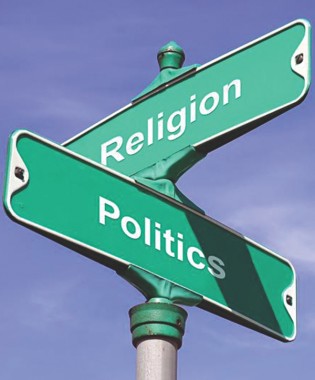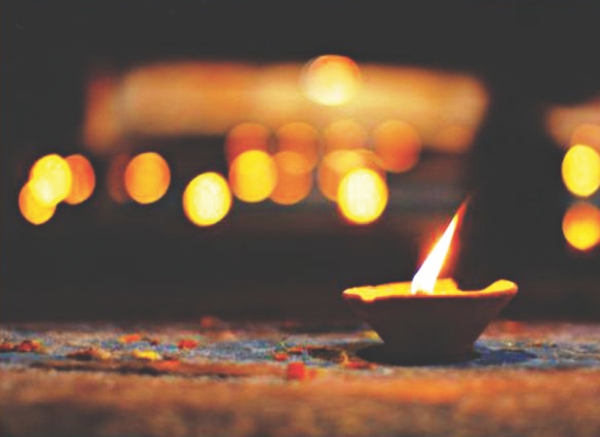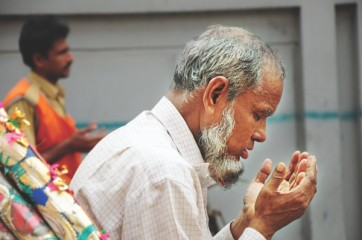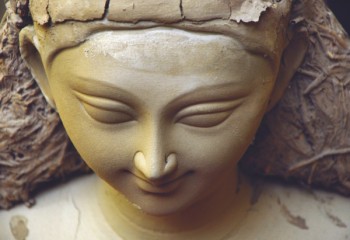The secularity of Bangladesh Constitution after 15th Amendment
Critics point out that retention of Islam as the 'state religion' and restoration of secularism at the same time can not go together. So, 15th amendment has been a mess, they claim. I argue that even retention of Islam under the garb of 'state religion' has not snatched away the secular character of the constitution. It will be proper to mention the relevant provisions of Article 2A after the 15th Amendment: The State Religion. The state religion of the Republic is Islam, but the State shall ensure equal status and equal right in the practice of the Hindu, Buddhist, Christian and other religion.” This gives rise to certain questions in mind: Is it necessary at all to retain a state religion in the constitution? To what extent theocratisation in the constitution may be allowed?
The word 'equal status' and 'equal rights' deserves concentration. A flexible reading of Article 2A under the marginal note 'the state religion' may be like this: State shall ensure equal status and equal rights in the practice of religions like Islam, Hinduism, Buddhisim, Christanity and Other religion. The earlier provision of the constitution on the point may be cited for better understanding: “The state religion of the Republic is Islam, but other religions may be practiced in peace and harmony in the Republic.” Such provision contained a sort of denunciation and a concession for other religions. Can we now regard the present provision a definite development towards religious equality and secularity? The mentioning of religions by name and conceding state's obligation to elevate the same status [as that of the state religion] better serves the connotation I am trying to fabricate to the word 'secularism'. The contextual interpretation of constitution suggests that 'state religion' in Bangladesh is not to be taken “as state's religion. Nor should it be taken to mean that the state, albeit an abstract entity, has retained a religion. Rather it is designed to signify that being majority people's religion, Islam commands separate mentioning. If the mass people are secular in thinking and practice (indeed so the Bangladeshi people), such mentioning does not snatch away the secular polity of the constitution.
Whether 'state religion' issue comes in conflict with principle of secularism we need to mention from the preamble first: “Pledging that the high ideals of nationalism, socialism, democracy and secularism, which inspired our heroic people to dedicate themselves to, and our brave martyrs to sacrifice their lives in, the liberation struggle, shall be the fundamental principles of the constitution.” A careful reading of this preambular pledge unfolds that Article 2A (State religion) is excluded from being the 'fundamental principles of this constitution.' It seems that these great words used in the preamble gain somber meaning when we are gripped by a grim crisis because 'secularism' as a cornerstone of the constitution is confused and bigoted both by the right and left body politic. It is settled law that a constitution is to be understood and interpreted in the lofty ideals of the preamble, as preamble is said to be the 'guiding star' (Per M H Rahman J in 8th Amendment Case, 1989) and touchstone of the constitution. The opening five words 'We, the People of Bangladesh' are revolutionary in the sense that it has recognised the people's sovereignty
on power in a locomotive manner. Indeed, these social-contract reflective words should be the entire fabric of the secular character of the constitution. The jurisprudence of secularism in its magnificent panorama should also embrace the nationalistic ethos and economic synthesis for an exploitation free society. (New Article 9 and 10)
The extent of meaning of secularism should be understood in the meaning as Bangabandhu coined and actually used in the constitution. The content of Bangladeshi secularism has found place in the revived Article 12. As per this Article the word secularism will mean the following: i) elimination of communalism ii) Non-granting of political status to a religion iii) Non-abusing religion for political purpose and iv) freedom of religion and practice of non-discrimination and non-persecution on religious grounds. It appears that the essence of secularism is not some thing divorced of religion, rather it has emphasised on not using religion to vindicate political purpose and religious freedom. To accentuate this proposition one should further conjunctively read Article 12 along with Article 39 and 41 of the constitution. Article 41 guarantees freedom of religion subject to law, public order and morality. The revived Article 38 runs as thus, “Every citizen shall have the right to form associations or unions, subject to any reasonable restrictions imposed by law in the interests of morality or public order.” However, there are certain qualification to form and becoming a member of an association or union. The proviso to Article 38 prohibits association if such is designed to i) destroy the religious, social and communal harmony among the citizens; ii) create discrimination among the citizens, on the ground of religion, race, caste, sex, place of birth or language iii) organise terrorist acts or militant activities against the State or the citizens or any other country and iv) thwart the objectives of the constitution. As such, it seems that the Bangabandhu-professed secularism as reflected in the original constitution (and now revived constitution except the concept of 'state religion') did not exalt irreligion nor it make secularism itself a religion rather it emphasised on freedom of and equality among religions discarding its western zeal.
Now, let me elaborate the matter from yet another viewpoint of constitutional interpretation. Article 12 squarely falls within the part of Fundamental Principles of State Policy (Part II from Article 8-25) of the constitution. A constitutional lawyer knows the significance of Fundamental Principles of State Policy (FPSP). It has been enshrined in Article 8 that FPSP (with the essence of nationalism, socialism, democracy and secularism) shall be i) fundamental to the governance of Bangladesh, ii) applied by the State in the making of laws iii) a guide to the interpretation of the Constitution and of the other laws of Bangladesh, and iv) form the basis of the work of the State and of its citizens. So the entire rubric of constitutional canvas should be taken in the light of these philosophical postulates. A harmonious construction of Article 2A, 8, 9, 10 and 12, therefore, discards any contradiction between the concept of 'state religion as used' and the concept of 'secularism' as envisaged. The secular think-tank of Bangladesh has always argued that 'secularism' in Bangladesh does not mean 'dhormoheenota'. Contrast between Article 2A and 12 is only possible when secularism is taken in this 'dhormoheenota' sense. Otherwise, a harmonious interpretation is very much within the constitutional contemplation. Some people say that FPSPs are 'not judicially enforceable'. This interpretation is obsolete now and constitutional and human rights jurisprudence has taken a new strategic approach to enforce the FPSPs in the form of socio-economic rights. With the mellowness of 'universality, inalienability, indivisibility' of human rights concept, the non-justiciability of state principles does not sustain at all. Bangladeshi secularism, without borrowing from western rationalism or Marxian materialism must go to its roots of comity and peaceful co-existence of the religions.
Many people have also raised the issue that using some religious words in the opening has tainted the provision of secularism. The opening with the Islaimic words 'bismillah-ar-rahman-ar rahim' is now suffixed with its Bangla translation and an addition of a purely common connotation like 'Creator' and 'Merciful'. This 'commonality' also gives the fuller meaning of secularism concept as the constitution in the present format is trying to convey. Even it may be submitted that starting with the creator's name has been so customary in our democratic fabric that it conveys not only a religious sense but also populised wisdom. Above more, a constitutional law student understands that the opening paragraph of the constitution starts with 'We, the people of Bangladesh (amra Bangladesh-er jonogon)' connoting paramount prominence of people's sovereignty and secularity of our democratic polity. In a 'People's Republic', the mentioning of the name of the religions should be treated a mere constitutional courtesy. In 5th Amendment Case, the Appellate Division has established that (also confirmed by the 15th Amendment of the Constitution) is basic structure of the constitution.
To reiterate, principle of secularism has forbidden the state to allow any body to use religion for achieving political ends. The provisions gives the full freedom of exercising one's own religion and refrain people to exploit religion for vindicating personal gain. To my understanding retention of secularism and state religion in a passionate form has glorified our constitution a great deal. The more and speedy we would understand it, the more welfare can stem out from it. Under the present form on the point, when Bangladesh would be said to be a secular state it would mean that we do not reject the reality of an unseen spirit or the relevance of religion in life. It would not mean that we acclaim irreligion. It would not mean that secularism itself would become a positive religion or the state assumes divine prerogatives. It should mean we would hold religious impartiality or comprehension or forbearance. The state religion in its present form is an admission that religion has a prophetic role to play within the national and international life.
In religions there are wide options, in traditions there are ample flexibility. Each generation can choose for emphasis the elements that appeal to it most. Religion thus becomes a reservoir, a source of strength for social cohesion and change. It is really tough to reject by a reformer the role of religion in making our polity because of some 'assumed theology' of secularism. To try to put our understanding of secularism into the western zeal would unreal escapism or impulsive rashness. Truth of religions should not be made irreconcilable with social and humanitarian ethos of our times. Nor would it be irreconcilable with reason. It should represent a pattern of institutional framework for a true synthesis of reason and compassion, spirit of tolerance and freedom of faiths. The observation of Indian Supreme Court in Atheist Society of India v. Govt. of AP (1992), may be relevant here, “Secularism is at once an ideal and an inspiration, a goal as well as a striving, a product as well as a process. It is made of aggregation rather than segregation, of synthesis rather than separation, of pluralism rather than dominance” (Per J E Prasad J).
A society should have the readiness to absorb a foreign concept. It's better to grasp it in its own societal concept. Which is the best constitution practicable for this or that set of circumstances and what are the best ways of preserving existing constitutions? The father of comparative constitutionalism Aristotle in his the Politics has responded to this question in this way: “Politics has to consider which sort of constitution suits which sort of civic body. The attainment of the best constitution is likely to be impossible for the general run of the states; and the good law giver and the true statesman must therefore have their eyes open not only what is the absolute best, but also to what is the best in relation to actual conditions.”
Therefore, in referring to secular constitution we should simply mean: a polity where there exists a genuine commitment to religious freedom what is manifest in the legal and political safeguards put in place to enforce that commitment. There are two alternative dimensions of secularity. First is the consequential dimension of religiosity which signifies that whether religion is deemed important by the people who practice it. It also pleads the religion's explanatory power in apprehending the structural configuration of a given society which also captures the anthropological concept of a cultural 'way of life' in which a religious systems of beliefs, symbols and values becomes ingrained in the basic structure of the society and ultimately sets the parameters within which vital societal relations occur. There is no reason why Bangladesh should think itself an exception.
The second dimension is the official cognisance of a religion. In such a dimension it is to be seen how far a state is decisively identified with any particular religious group. The essence of such an approach is the government's neutrality to religion where formal identification of a state with a particular religion does not in itself remove the state from the category of secular regimes. Sweden, for example, has had an established Church, but the legal designation hardly disqualifies that country from asserting its secular credentials. We can accommodate Bangladesh even within this dimension. The constitutional promise of state neutrality toward religious groups is corollary of the transformational agenda of Bangalee nationalism (Article 9), a cardinal objective of which the democratisation of a social order inhabited by a thickly constituted religious presence.
 To try to put our understanding of secularism into the western zeal would unreal escapism or impulsive rashness.
To try to put our understanding of secularism into the western zeal would unreal escapism or impulsive rashness.
T N Madan, a famous Indian sociologist delivered a controversial and influential address to the Association of Asian Studies in Boston in 1989, wherein he argued: “In the prevailing circumstances secularism in South Asia as a generally shared credo of life is impossible, as a basis for state action, impracticable; and as a blueprint for the forseeable future, impotent.” Madan had his own reasons for reaching such a conclusion. But there are at least two basic reasons why western concept of secularism should not find its recognition in Bangladesh constitutional culture and morality. Firstly, the western concept of secularism does not naturally flow from many religions and secondly, religion zealots often use religion to mobilise the masses to advance their own agendas. Apart from that three important aspects of threat for a successful secular polity can be traced in modern times. First, the rise of human rights in international law has given religious freedom a superimposed legality on the national and municipal landscape. In other words, the right to profess or propagate one's religion is no longer dependent on whether or not the constitution recognises such a right. Second, widespread migration in different countries has brought the necessity to respect religion under the garb of legal protection. In the third place, population of many countries has rejected the secularism divorced of religion as soulless and morally bankrupt. And to this, scheming and unscrupulous politicians who use religion to win votes are even more problematic.
'Islam' as the 'state religion' in a sweeping language was inserted in 1989 by the 10th Amendment. When secular character of the constitution was restored firstly by the apex court of Bangladesh by nullifying the 5th Amendment and secondly through 15th Amendment by the parliament, the 'state religion' provision was not attracted. It was a question for the parliament whether Islam as a state language should be deleted or not. The religious zealots and politics having religious fervour appeared as barrier having its emphasis on 'delete Islam'. So, it was wise for parliament to accommodate some avenue for the 'secularism' even recognising the presence of religion in Bangladeshi body politic. The readers perhaps would see that in the face of religious concern even a women policy providing equal access to property had to be defended by the Prime Minister herself with the civil society's voice unheard! Attaining the objectives of a secular state by giving it a sombre meaning is better than to put fanatics in the streets all the year round leaving constitutionalism itself in jeopardy. Therefore, secularisation does not lie merely in constitutional deliberation or adjudication but in the building of a strong civic culture and traditions where respect, tolerance and accommodation are second nature. It requires that the people believe in the value of human life, liberty and human dignity. That's why it is argued that we want to establish a workable secular state keeping religion somewhere in the background. With some positive recognition of religions, the principle of secularism is thus anchored in our constitution. The recognition of religions under the state's garb can at best be a constitutional courtesy, which may not imply any deviance from the paramountcy of secularity as the warp and woof of the constitutional fabric. Now it is up to us what kind of secularism we would develop in the days to come. To finish let me quote Justice V R Krsihna Iyer: “Secularism is a goal as well as a process. As an ideology and as a bundle of working norms, it is conditioned by the past legacies and the prevailing realities. It also shapes the course of social evolution and the thought processes.”
...................................................................................
The writer is Assistant Professor, Department of Law, Jagannath University, Dhaka.
E-mail: billah002@gmail.com



 For all latest news, follow The Daily Star's Google News channel.
For all latest news, follow The Daily Star's Google News channel. 






Comments